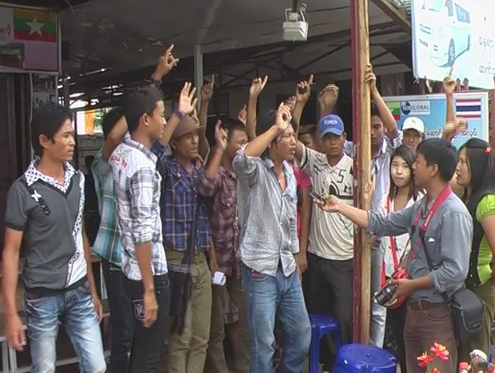Burmese migrants protested outside the office of a “broker agency” in Mae Sot on Monday after paying exorbitant rates for fraudulent documents that later led to their arrest.
According to the protestors, in March a group of 45 Burmese migrants in Mae Sot paid 12,000 baht each to an agent known only as “Charlie”, who took them to Chiang Mai to apply for temporary passports.
Once in the northern Thai capital, the migrants were arrested for filing counterfeit paperwork.
“The [agent] promised us the passports and took us to [Chiang Mai], with all the necessary paperwork,” said one of the migrants joining the protest during an interview with DVB.
“But when we got there, we were arrested by the police – they said, ‘we don’t want to see your faces again. You aren’t here legally and the [paperwork] is fake’.”
Thirty-nine of the migrants were released after four days in detention and later returned to Mae Sot.
On Monday, the group staged a protest in front of the agent’s office calling for the release of the remaining six migrants who are still incarcerated. The migrants also demanded refunds if their temporary passports are not granted to them.
“And now the [agent] said he will only give us back 8000 Baht each,” said the migrant.
According to the Charlie, he had no intention of coercing the group and claimed to have completed the procedure numerous times for migrants in Thailand.
“I have sent four groups before and they didn’t get arrested – just this group now,” said the agent.
Following the protest, the agent agreed promised to deliver their passports by 19 June.
“Now we are going to sign an agreement [to wait until 19 June] and we will wait and see whether we’ll get the passports or not,” said the migrant interviewed by DVB.
Due to mass corruption and bureaucratic failures on both sides of the border, migrants are often coerced and extorted by “agents” while trying to secure the necessary legal documents and find work in Thailand.
Migrants in Thailand make up an estimated five percent of the county’s workforce, and provide a vital source of labour for low-skilled industries. Up to three million people, or about 80 percent, are estimated to come from Burma, and are forced to live a quasi-legal existence that leaves them vulnerable to exploitation.



